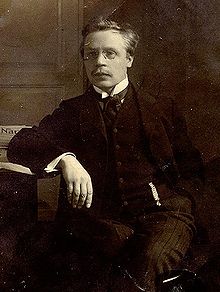Mait Metsanurk
Mait Metsanurk (* 19th November 1879 on the farm Saare, village Metsanuka, rural community of Tartu , Tartu county / Livonia ; † 21st August 1957 in Tallinn ) was an Estonian writer , whose name was real name Eduard Hubel.
Early years
Mait Metsanurk was born into a farming family as the youngest of eight children. He attended the elementary school in Orge and the Russian-speaking city school in Tartu . He then took a few courses in education . Then he got by with various jobs, first as a clerk, then as a school teacher and from 1906 as a journalist .
writer
Mait Metsanurk achieved his literary breakthrough in 1908 with realistic descriptions of Estonian urban and rural life at the time. Above all, the social contrasts and tensions are processed in his work. Mait Metsanurk became one of the most productive and popular writers and playwrights of his era. Together with Anton Hansen Tammsaare (1878–1940) he is considered to be one of the most outstanding representatives of Estonian realism of the interwar period. His main work, the historical novel Ümera jõel (1934), describes the struggle of the pagan Estonians against the Danish and German conquerors and became a novel of identification of the time. He also worked as a literary critic and translator.
1924/25 and from 1930 to 1936 Mait Metsanurk was chairman of the Estonian Writers' Union .
With the Soviet occupation of Estonia, Mait Metsanurk was sidelined politically and culturally. However , he was spared the deportation to Siberia , which many Estonian writers suffered. Mait Metsanurk was not rehabilitated until 1956, after the end of Stalinism . He is buried in the Tallinn Forest Cemetery.
Literary work
Prose works
- "Isamaa õilmed" (story, Tallinn 1908 )
- "Vahesaare Villem" (novel, Tallinn 1909 )
- "Jumalalapsed" (short stories, Tallinn 1910 )
- "Orjad" (novel, Tallinn 1912 )
- "Toho-Oja Anton" (Novella, Tallinn 1916 )
- "Ennäe inimest!" (Novel, 1918 )
- "Epp" (story, Tartu 1920 )
- "Jumalata" (story, Tallinn 1921 )
- "Taavet Soovere elu ja surm" (novel, 1922 )
- "Valge pilv" (novel, Tartu 1925 )
- "Jäljetu haud" (novel, Tartu 1926 )
- "Viimne päev" (Collection of short stories, Tallinn 1927 )
- "Punane tuul" (novel, Tartu 1928 )
- "Jutustused ja novellid" (Stories and short stories, Tartu 1929 )
- "Fr. Arraste & Pojad" (Roman, Tartu 1930 )
- "Elu murrab sisse" (collection of short stories, Tartu 1931 )
- "Taniel heitleb" (story, Tartu 1932 )
- "Maine ike" (collection of short stories, Tartu 1933 )
- "Mändide all" (youth story, Tartu 1933 )
- "Ümera jõel" (novel, Tartu 1934 )
- "Soosaare" (novel, Tartu 1936 )
- "Kutsutud ja seatud" (diary novel, Tartu 1937 )
- "Tuli tuha all" (novel, Tartu 1939 )
- "Tea algul. Mälestused I" (Memories, Tallinn 1946 )
- "Suvine pööripäev" (novel, Tallinn 1957 )
Plays
- "Uues korteris" (Comedy, Tallinn 1908 )
- "Vagade elu" (Comedy Tartu 1923 )
- "Kindrali poeg" (Drama, Tartu 1925 )
- "Talupoja poeg" (Drama, Tartu 1929 )
- "Mässuvaim ehk Agulirahvas läheb ajalukku" (Comedy, Tallinn 1931 )
- "Haljal oksal" (Comedy, Tallinn 1932 )
- "CR Jakobson" (Drama, Tartu 1935 )
- "Maret elukoolis" (Comedy, Tallinn 1938 )
literature
- H. Raudsepp: Mait Metsanurk yes tema aeg . Tartu 1929.
Web links
- About Mait Metsanurk and his work (Estonian)
| personal data | |
|---|---|
| SURNAME | Metsanurk, Mait |
| ALTERNATIVE NAMES | Hubel, Eduard |
| BRIEF DESCRIPTION | Estonian writer |
| DATE OF BIRTH | November 19, 1879 |
| PLACE OF BIRTH | Hof Saare, Metsanuka, rural community of Tartu , Tartu county , Livonia |
| DATE OF DEATH | August 21, 1957 |
| Place of death | Tallinn |
